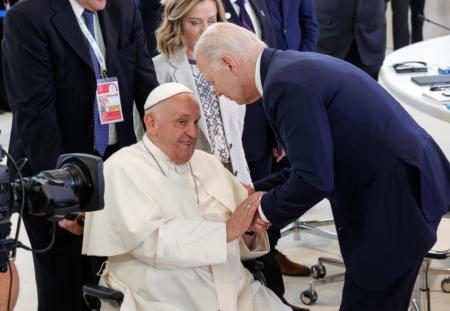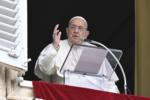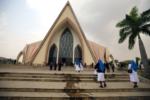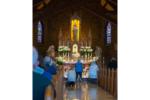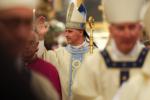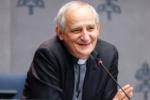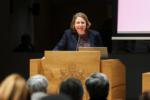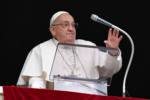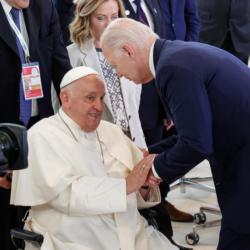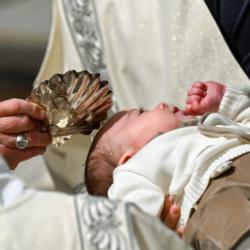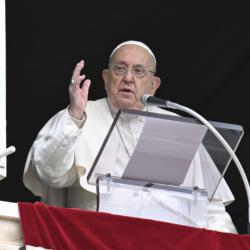Faith is a way of life, not a label, pope says in Papua New Guinea
PORT MORESBY, Papua New Guinea (CNS) -- In a country where most people identify as Christians and where the Parliament approved a measure to officially declare it a Christian nation, Pope Francis insisted that faith must be a way of life, not a label.
"For all those who profess to be Christians -- the vast majority of your people -- I fervently hope that faith will never be reduced just to the observance of rituals and precepts," the pope told Papua New Guinea's government leaders and representatives of civil society.
Pope Francis met with about 300 leaders at APEC Haus, a conference center in Port Moresby, Sept. 7 after a private meeting at Government House with Bob Dadae, governor general of Papua New Guinea.
At the conference center, Dadae told Pope Francis, "climate change is real," and rising sea levels threaten the very existence of some of his nation's islands. The governor general thanked Pope Francis and Catholic leaders for their commitment to teaching people about the moral obligation to protect the environment.
The governor general also thanked Pope Francis for the work the Catholic Church is doing in Papua New Guinea to help stop violence against women. "We want to acknowledge the role of the woman and her need for protection," Dadae said. "A female is not just a mere gender, but a special gift from God to bear a nation, and like mother nature she keeps and sustains humanity."
"Your Holiness, in a world of greed and turmoil, your voice will be better heard by the world to love and respect the rise of women in a free world," he said.
In response, Pope Francis added to his prepared text, saying that women "are the ones who carry a country forward; women have the strength to give life, to build, to make a country grow."
"Do not forget that women are on the front lines of human and spiritual development," Pope Francis said. His remarks were greeted by applause.
Traditional dancers welcomed Pope Francis to the APEC Haus, and after his speech the Symphony of Hope, an orchestra made up of 27 children, aged 8-14, played the Argentine national anthem for him.
In his speech, the first of his three-day stay in Papua New Guinea, Pope Francis mentioned many of the country's most pressing problems: poverty, ethnic violence, exploitation of natural resources and conflict over the potential independence of the Autonomous Region of Bougainville.
In a 2019 referendum, nearly 98 percent of the population of Bougainville voted in favor of independence, but the results still must be ratified by Parliament, and the pope said he hoped the issue could be resolved through negotiations "while avoiding the rekindling of ancient tensions."
Regarding the ethnic conflicts that have killed hundreds of people over the past 20 years and displaced thousands as clan members fight over territory or avenge perceived wrongs, the pope said he hoped they would come to an end.
"It causes many victims, prevents people from living in peace and hinders development," the pope said. "I appeal, therefore, to everyone's sense of responsibility to stop the spiral of violence and instead resolutely embark on the path that leads to fruitful cooperation for the benefit of all the people of the country."
The use of Papua New Guinea's natural resources also must benefit the entire nation and not just a few people, Pope Francis said, insisting "these goods are destined by God for the entire community. Even if outside experts and large international companies must be involved in the harnessing of these resources, it is only right that the needs of local people are given due consideration when distributing the proceeds and employing workers."
The forests, mineral wealth and natural gas reserves represent "a great responsibility, because they require everyone, civil authorities and all citizens, to promote initiatives that develop natural and human resources in a sustainable and equitable manner," the pope said.
Their management, he said, must improve "the well-being of all, excluding nobody, through concrete programs, international cooperation, mutual respect and agreements beneficial to all parties."
The leaders of other Pacific-island nations -- Nauru, Tonga, Vanuatu -- and the secretary-general of the Pacific Islands Forum also attended the meeting and had an opportunity to greet the pope.
Thanking the government and people for welcoming him, Pope Francis said Papua New Guinea is "so far from Rome and yet so close to the heart of the Catholic Church. For in the heart of the church is the love of Jesus Christ, who on the cross embraced all men and women."
The Gospel "is not tied to any earthly power but is free to nourish every culture and make the kingdom of God -- a kingdom of justice, love and peace -- grow in the world," the pope said. "May this Kingdom be fully welcomed in this land, so that all the peoples of Papua New Guinea, with the variety of traditions, may live together in harmony and offer the world an example of fraternity."
